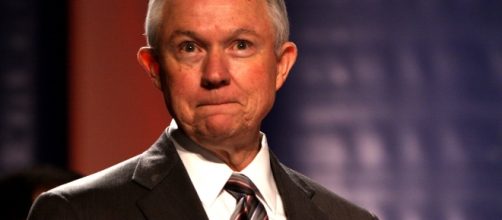For the second day in a row, US President Donald trump took to Twitter to lambast Attorney General Jeff Sessions. He criticized the “beleaguered” Attorney General for recusing himself from the Russia investigation and failing to appropriately investigate Hillary Clinton, whom Trump referred to as “Crooked Hillary."
Attorney General Jeff Sessions has taken a VERY weak position on Hillary Clinton crimes (where are E-mails & DNC server) & Intel leakers!
— Donald J. Trump (@realDonaldTrump) July 25, 2017
So why aren't the Committees and investigators, and of course our beleaguered A.G., looking into Crooked Hillarys crimes & Russia relations?
— Donald J. Trump (@realDonaldTrump) July 24, 2017
Jeff Sessions: Long-time supporter
Sessions was an early supporter of Trump’s campaign.
He endorsed Trump in February of 2016 when it was still unclear as to whether the inexperienced Trump could prevail over the crowded field of Republican career politicians.
As senator of Alabama, Sessions was the first sitting senator to endorse Trump, calling Trump’s campaign “more of a movement” than just an ordinary campaign.
On November 18, 2016, after unexpectedly winning the election, Trump nominated Sessions as his attorney general. This decision irked many Democrats. As a US District Attorney for Southern Alabama in 1985, Sessions became the first attorney to prosecute former civil rights activists for voter fraud. This action ultimately caused the Senate to deny him a federal judgeship in 1986.
In the run up to his Senate confirmation hearing in January, there were many calls from modern-day civil rights activists to deny Sessions the attorney general position.
Jeff Sessions: Russia mix-up
Other notable issues concerning Sessions’ hearing were his responses to questions posed by Senator Al Franken (D-Min.) about having had any involvement with Russia.
By the time of Sessions' hearing, there had already been a lot of buzz about Russia’s involvement in the 2016 election.
As recently as December, former US President Barack Obama expelled 35 Russian operatives and imposed sanctions on the Russian government in response to confirmation that members of the Russian state had been responsible for orchestrating leaks within the Democratic National Convention in June of 2016.
During the hearing, however, Sessions claimed to have had no interaction with Russians. He clarified only when it was later revealed that he had indeed met with Sergey Kislyak, the Russian ambassador to the United States, on two sperate occasions. Sessions claimed that since he had met Kislyak in his capacity as a senator, and not a member of Trump’s administration, he felt it was not necessary to mention the meetings in the Senate hearing.
Offer to resign
In response to mounting pressure, Sessions eventually recused himself from all investigation into Russia’s role in the 2016 election. He handed over all responsibilities to his deputy, Rod Rosenstein.
This is a decision that appears to have irked Trump.
There are several agencies investigating Russia’s role in the election, including separate Senate and House Intelligence Committees, as well as special prosecutor Robert Mueller, who was appointed after the sudden dismissal of former FBI chief James Comey. Investigations are also being carried out by the FBI, whose new chief Chris Wray has made a point of emphasizing his independence from Trump's administration.
Having an ally like Sessions in the office of the attorney general would have given Trump greater leverage in guiding investigations. However, because Sessions has recused himself, that is no longer an option.
It is clear temperatures are rising. In June, Sessions offered to resign. Although Trump rejected his resignation then, he might accept it now.
According to sources inside the administration, Trump is now eyeing former New York mayor Rudy Gulliani for the position.
Sessions has said that he would stay on as attorney general for “as long as was appropriate." It appears that his tenure will not be appropriate for much longer.


